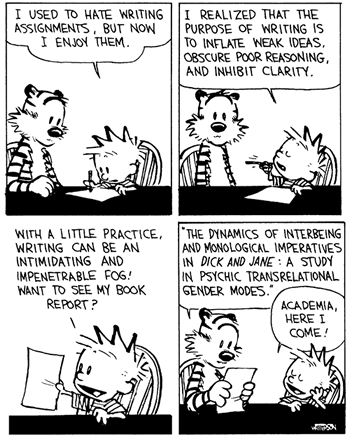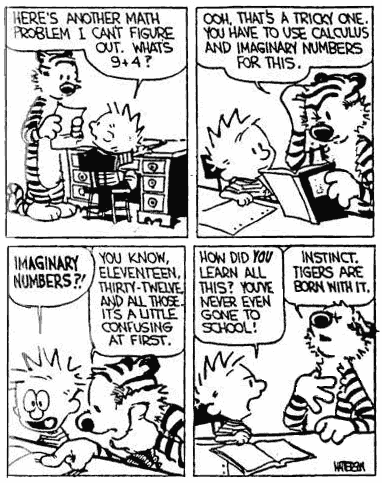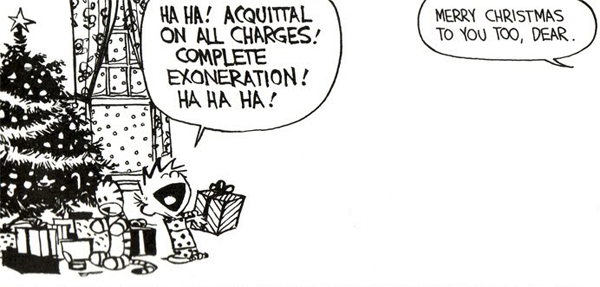More Calvin & Hobbes humor. Bill Waterson is a genius.
Tag: Calvin & Hobbes
Imaginary numbers
Entrepreneur Calvin
Merry Christmas to you too
Words fail me
18 de noviembre
- Día de La Virgen de Chiquinquirá. Anoche se escucharon muchos cañonazos de júbilo.
- Hace 26 años, se publicó la primera tira de Calvin & Hobbes, favorito de la casa. Hoy debería yo imitar a Calvin en la imagen que escogí el año pasado.
- El doodle de hoy conmemora el 224° cumpleaños de Louis Daguerre.
- Un 18 de noviembre de 1907 nació Máximo Francisco Repilado Muñoz, el gran Compay Segundo. Y también un 18 de noviembre, de 1917, nació Pedro Infante. Agrego que Pedro Infante significó mi primera aproximación a la música popular. De hecho, creo recordar que la primera canción que me aprendí completa fue “La Calandria” (excluyendo, por supuesto, las canciones infantiles y escolares). Un grande, Pedro Infante. Una de las voces más melodiosas que he escuchado.
Alguna vez, yo también
I used to know that

Just for the record: Light in its natural state is white light, i.e., it comprises the seven wavelengths of the visible spectrum as it moves from infrared to ultraviolet (such wavelengths correspond to colors red, orange, yellow, green, blue, indigo, and violet.) The sky and the clouds act as filters for white light. Regarding the clouds, its water droplets or ice crystals scatter the light uniformly, meaning that light is not separated, remaining white. I used to know that. By the way, a qualifying exam to be a dad would likely amount to human extinction.
You’ve taught me nothing except how to cynically manipulate the system
The Purpose of Writing

It’s not that exaggerated, indeed. A lot of scientific papers are just blatant mumbo-jumbo, written for the sake of uncommunication, for the sake of piling up academic publications. Worse yet, sometimes scientific writing promises everything and delivers nothing. I’ve just read an article entitled “Deus ex machina”, which promised a review of a current research linking metaphysics and computing, only to discover at the end of my reading that I had been framed: the article provides almost no new information and it fills the page talking about obvious things (remarks in the fashion of: “scientists are working on this interesting combination of fields”, “progress is expected”, “this research may answer important questions”, and pure zilch). That’s why scientific publications have to be handled with care, as you don’t want to waste your time reading void or undecipherable boasting.






